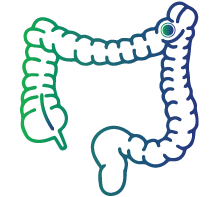
Carcinoembryonic Antigen (CEA) Test
Carcinoembryonic Antigen (CEA)
The carcinoembryonic antigen (CEA) test measures the amount of carcinoembryonic antigen in your blood. CEA is a protein usually present in the unborn child. After birth, the blood level of this protein vanishes or drastically decreases. A high level of CEA in adults may be a sign of cancer. Healthcare providers use this test to screen your risk of developing various cancerous and non-cancerous tumours.
CEA test is also known as CEA Assay, Carcinoembryonic Antigen Test, Carcinoembryonic blood test
What is a CEA test used for?
CEA test is used in the diagnosis of various cancers like:

Colorectal or bowel cancer

Prostate cancer

Ovarian cancer

Lung cancer

Thyroid cancer

Liver cancer

Pancreatic cancer

Breast cancer

Urinary tract cancers
Who should get tested?
CEA test is recommended to be performed frequently for individuals at increased risk of having higher levels of CEA and those who have been already diagnosed with cancer. The following combination of factors and symptoms can increase the risk of developing excess CEA.

Age over 65 years

Being overweight or obese

A personal or family history of cancer

Smoking

Consumption of alcohol

Unusual weight loss

Swelling of neck

Swelling or stiffness of the chest

Inflamed (red) eye

Recurrent skin infections
Test preparation:
The carcinoembryonic antigen is a simple blood test. It is recommended to avoid smoking before 24 hours of sample collection. Make sure to inform your healthcare provider about your medications, physical activity, and diet because all of these might be a reason for the elevated levels of CEA
Interpretation of results
|
Range of CEA |
Inference |
|
0 to 2.5 ng/mL
|
Normal |
|
0 to 5 ng/mL |
In the case of Smokers (Normal) |
|
>10 ng/mL |
Extensive |
|
>20 ng/mL |
Metastasis (Spread to other parts) |
Deviation from the normal range indicates the following:
· A CEA test is used as a screening tool for early cancer detection, to monitor the response towards the given treatment. The range of CEA in normal blood is 0 to 2.5 nanograms per millilitre (ng/mL).
· If CEA levels remain high after therapy, the outcome may not have been as positive as anticipated.
· Levels above 10 ng/mL indicate that cancer may be progressing, whereas anything over 20 ng/mL indicates the spread of cancer to other organs.
· In case you have undergone a CEA test before the beginning of cancer treatment:
· Low level of CEA may indicate that your cancer cells are fewer and the disease has not spread to other body parts.
· High level of CEA may indicate that your cancer cells are many and the disease has spread to other body parts.
· In case you have undergone a CEA test after the beginning of cancer treatment:
· Low level or decrease in the level of CEA may indicate that the course of treatment is effective.
· High level or increase in the level of CEA may indicate that the course of treatment is ineffective.
FAQs
Why do I need CEA test?
This test is performed to screen for the recurrence of colon and other cancers such as medullary thyroid cancer and malignancies of the rectum, lung, breast, liver, pancreas, stomach, and ovaries. It is also used to determine the effectiveness of cancer treatment
What non-cancerous conditions can increase my CEA levels?
Non-cancerous conditions like emphysema of the lungs, cirrhosis of the liver, cholecystitis (gall bladder inflammation), pancreatitis (pancreas inflammation) and peptic ulcer can increase your CEA level
How CEA test is carried out?
During this blood test, a healthcare professional will take a small amount of blood sample from a vein in your arm using a small needle, which is collected into a test tube or vial. This usually gets over in less than a few minutes
Is there are any risk involved in the CEA test?
The CEA test is a simple blood test procedure. When the needle pricks your arm or hand, you could feel a slight sting or pain. The area could be painful thereafter. Sometimes bruising, bleeding, infections, and dizziness may occur around the area of needle insertion
How long should I wait for my CEA test results?
The CEA test results are available within 2-3 working days. Test results might be mailed or made available online through health portals. Your doctor might also contact you by phone or email to go over your test findings or to arrange a follow-up appointment

